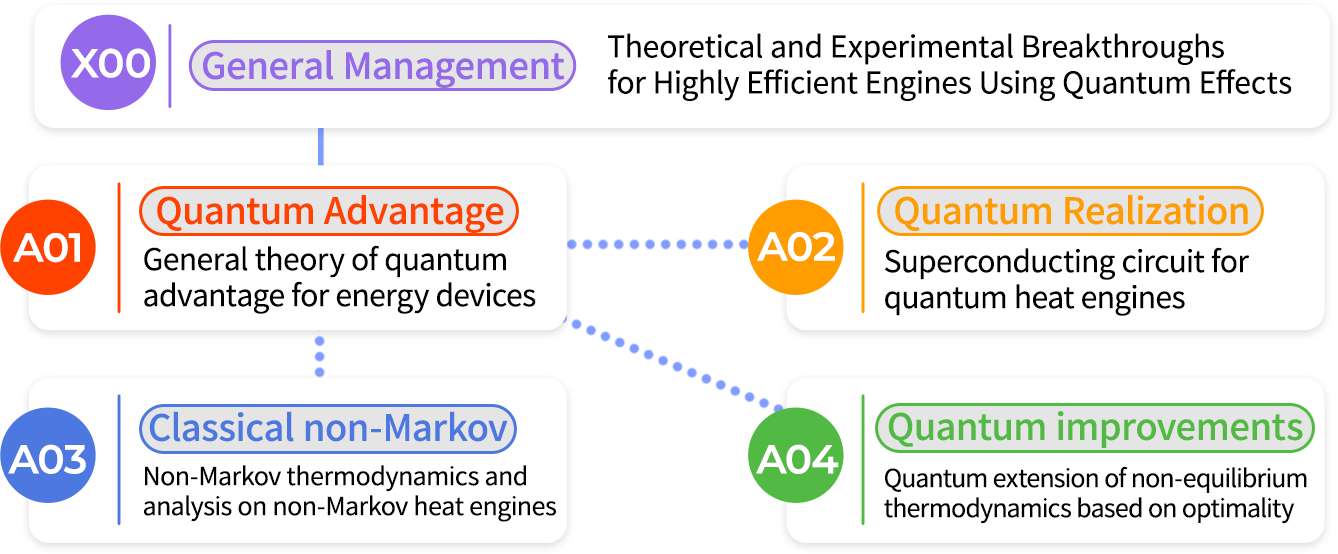About
Overview of the Research Area
The balance between energy generation and consumption is expected to be a major issue in the near future. While energy consumption, especially in the IT field, has been increasing exponentially, the principle of energy generation has remained essentially unchanged since the days of the steam engine. In this research area, we aim to achieve a fundamental breakthrough in this problem, both theoretically and experimentally, by using quantum effects. Specifically, we will theoretically establish that the “quantum advantage,” in which quantum computers show overwhelmingly high efficiency compared to classical computers, can be realized in energy devices such as engines, and furthermore, we will demonstrate this at the laboratory level.
Objective
Theoretical and Experimental Breakthroughs for Highly Efficient Engines Using Quantum Effects
In this research area, we aim to fundamentally advance recent thermodynamic theories and study highly efficient energy generation and utilization through quantum effects, both theoretically and experimentally. While quantum effects have so far improved the performance of many devices, these improvements have been limited to information-related technologies such as communication, computation, and sensing. However, as exemplified by energy problems, the real world faces many issues that are not directly connected to information technology. Many of these problems have structures that can be captured within the framework of quantum thermodynamics, and it is expected that a similar approach to the one applied to energy problems can be used. By advancing the quantum approach to energy problems in this research area, we aim to provide prescriptions for solving a wide range of non-information-related issues with quantum solutions.
Specific Goals
- A general theory of quantum advantage for general energy devices (Goal for Group A01)
- Realization of quantum advantage of heat engines in the laboratory (Goal for Group A02)
-
Theoretical check of the possibility for the simulation of quantum enhancement by a classical non-Markov process (Goal for Group A03)
- Finding a stronger quantum improvement and proving its optimality (Goal for Group A04)
Structure of the research area

Group X00:General Management
Area Representative: Hiroyasu Tajima
This group will accelerate the total activity of the research area by promoting collaborative research, public relations, information dissemination, and international activities.
Group A01:Quantum Advantage
General theory of quantum advantage for energy devices
In recent years, utilizing the properties of quantum mechanics has enabled significant performance improvements in various tasks such as computation and sensing. In these developments, Tajima and Funo ( PI and Co-I of Group A01) have proposed a theory suggesting that by using quantum effects, energy devices such as heat engines can achieve linear-order performance improvements, surpassing classical limits. This result represents the first example of “quantum advantage” in the power-efficiency tradeoff in Markov heat engines, but the full potential, including higher-order performance improvements, remains unexplored. Therefore, Group A01 aims to tackle this unexplored field and seek a general theory regarding performance improvements of energy devices beyond the linear order through quantum effects. Additionally, by utilizing such performance enhancements, we aim to propose theories for the experimental implementation of heat engines that combine ideal heat-work conversion efficiency with high output, thus triggering breakthroughs in energy science.
Group A02:Quantum Realization
Superconducting circuit for quantum heat engines
Group A02 aims to demonstrate quantum heat engines that outperform traditional heat engines governed by classical mechanics, by constructing heat engines using superconducting quantum circuits. Superconducting quantum circuits, which can be controlled and measured with high precision, have been highlighted as a platform for information thermodynamics. By leveraging these characteristics and further developing the integrability and high-precision control techniques of superconducting quantum circuits, we believe it is possible to construct quantum heat engines where multiple qubits operate cooperatively. Through these studies, Group A02 aims to evaluate quantum advantage in heat engines and pioneer quantum control techniques using fully connected quantum circuits.
Group A03:Classical non-Markov
Non-Markov thermodynamics and analysis on non-Markov heat engines
In the realm of classical non-Markovian processes, a general analytical method developed by Kanazawa (PI of Group A03), is being established. Group A03 aims to extend this method to establish a theory that examines the performance limits of heat engines governed by classical non-Markovian processes. Simultaneously, in collaboration with Group A01, we will also develop the framework of quantum thermodynamics for non-Markovian processes.
Group A04:Quantum improvements
Quantum extension of non-equilibrium thermodynamics based on optimality
Group A04 has been optimizing thermodynamic trade-off relations using geometric methods such as optimal transport and information geometry. In fact, Ito (PI of Group A04) and his colleagues derived the thermodynamic trade-off relation equations based on optimality in classical systems. We aim to extend Ito’s thermodynamic trade-off relations to quantum systems and develop geometric optimization methods for quantum systems. Since the inequalities provided by the result by Tajima and Funo (introduced in the explanation of Group A01) can be considered thermodynamic trade-off relations in quantum systems, we also aim to improve and optimize the performance of quantum heat engines by utilizing the developed methods.

